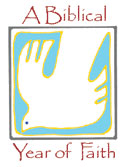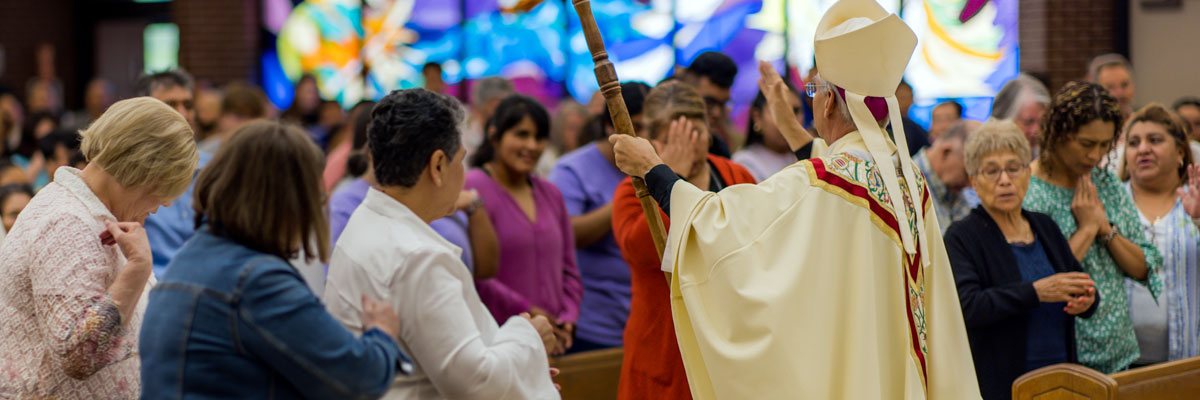Official Website of the
Catholic Diocese of Little Rock
Jesus sends witnesses to ends of earth
Published: November 9, 2013
This is the final column in a 14-part series
By Clifford M. Yeary
Associate Director, Little Rock Scripture Study
Our Year of Faith has been intended to stir up the evangelical nature of our faith. As Catholics, as Christians, we are to be evangelists, people who become vibrant witnesses to the mercy which God showers us in Christ. In 13 previous articles we have explored how the faithful in biblical times have responded to God's love amid the challenges of life. In this final article we start, in a way, at the beginning. The Book of Acts is a fast-paced account of the Church's beginnings and a fascinating description of Christian faith in action.
 For 40 days following his resurrection, Christ met with the Apostles, eating with them and speaking with them concerning the kingdom of God (Acts 1:3). In one last instruction before ascending to the Father, he tells them, "You will receive power when the Holy Spirit comes upon you, and you will be my witnesses in Jerusalem, throughout Judea and Samaria, and to the ends of the earth" (Acts 1:8).
For 40 days following his resurrection, Christ met with the Apostles, eating with them and speaking with them concerning the kingdom of God (Acts 1:3). In one last instruction before ascending to the Father, he tells them, "You will receive power when the Holy Spirit comes upon you, and you will be my witnesses in Jerusalem, throughout Judea and Samaria, and to the ends of the earth" (Acts 1:8).
The Apostles are to be Christ's witnesses, beginning in Jerusalem, but eventually proclaiming the Gospel to the ends of the earth — which, from the focus of the Book of Acts, we understand to be Rome, the capital of the empire dominating the Mediterranean world. Through all manner of opposition and persecution they will be his witnesses, but not until they have received power from the Holy Spirit.
Readers of Luke's Gospel will recognize the importance of the Holy Spirit's power in every stage of Jesus' ministry. The Virgin Mary conceives Jesus when the Holy Spirit comes upon her and "the power of the Most High" overshadows her (Luke 1:35). At his baptism by John in the Jordan "the Holy Spirit descended upon him in bodily form like a dove" (Luke 3:22). Led by the Holy Spirit into the desert where he resists all temptations, he returns to the region of Galilee to enter fully into his mission "in the power of the Spirit" (Luke 4:1-14).
The Apostles are to await the outpouring of the Holy Spirit because their witness to Christ means continuing the ministry of Christ "to the ends of the earth." After receiving the Holy Spirit at Pentecost, they boldly proclaim the Good News of Jesus' death and resurrection, but their witness is not limited to words alone. They extend God's love for all by performing the same merciful acts Jesus performed in his ministry. Because they have been sent in the power of the Holy Spirit, they can offer healing from illness, power over every evil affliction and a new life for an estranged humanity in a loving community.
Their evangelizing quickly brings about a new community, one whose life together is itself a witness to the transforming power of the Holy Spirit. "They devoted themselves to the teaching of the Apostles and to the communal life, to the breaking of the bread and to the prayers" (Act 2:42). The "communal life" was one where no one among them suffered from a lack of any necessity, for "all who believed were together and had all things in common" (Act 2:44).
We know that this was a rather idealized vision of what life was supposed to be like in the early community because of how soon we learn of acts of greed and deceit within the community (Acts 5:1-11). In presenting the ideal, Luke was intentionally calling his own local church into striving for the ideal.
That it was, at best, a short-lived ideal in the earliest Christian community does not detract from the fact that true Christian fellowship can and will produce communities of genuine love and care for all. In the power of the Holy Spirit, Luke's vision could even come to describe our own parishes and our own family life.
After all, the essentials for such a community still belong to us. The Holy Spirit has been poured into us. When we devote ourselves "to the teaching of the Apostles and to the communal life, to the breaking of the bread and to the prayers" (Acts 2:42), we fulfill what we profess about the Church in the creed, that it is "one, true, holy and Catholic."
May this Year of Faith bear fruit throughout our lives, so that who we are will be a witness "to the ends of the earth."
Study Questions
- In what ways has this special Year of Faith made a difference in your own faith life?
- Whose witness to faith in Christ has had the biggest impact on your life?
- What were the essential aspects of the life the earliest Christians shared together? How important are these same aspects for Christians today?
- What are some of the practical ways your parish community bears witness to the community at large of its life in Christ?
This article was originally published in Arkansas Catholic Nov. 9, 2013. Copyright Diocese of Little Rock. All rights reserved. This article may be copied or redistributed with acknowledgement and permission of the publisher.









